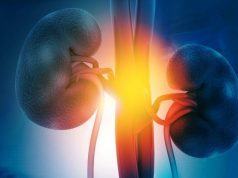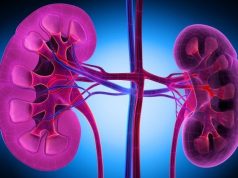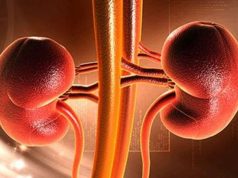No significant slowing in kidney function decline after one year for adults with chronic kidney disease
WEDNESDAY, May 9, 2018 (HealthDay News) — Coaching to increase water intake does not significantly slow the decline in kidney function among adults with chronic kidney disease, according to a study published in the May 8 issue of the Journal of the American Medical Association.
William F. Clark, M.D., from the London Health Sciences Centre in Canada, and colleagues conducted a randomized trial involving patients with stage 3 chronic kidney disease and a 24-hour urine volume of less than 3 L. The 316 patients in the hydration group were coached to drink more water, while the 315 in the control group were coached to maintain their usual intake.
The researchers found that among the 590 survivors with one-year follow-up measurements, the hydration group had a mean change in 24-hour urine volume that was 0.6 L per day higher (95 percent confidence interval, 0.5 to 0.7; P < 0.001). The mean change in estimated glomerular filtration rate was −2.2 and −1.9 mL/min/1.73 m² in the hydration and control groups, respectively (adjusted between-group difference, −0.3 mL/min/1.73 m²; 95 percent confidence interval, −1.8 to 1.2; P = 0.74).
“Among adults with chronic kidney disease, coaching to increase water intake compared with coaching to maintain the same water intake did not significantly slow the decline in kidney function after one year,” the authors write.
Several authors disclosed ties to Danone Research, which partially funded the study; Thermo Fisher Scientific provided the instrumentation assay reagent and disposables for the analysis.
Copyright © 2018 HealthDay. All rights reserved.








